Entrepreneurship in Business: Case Study of Mark Zuckerberg's Facebook
VerifiedAdded on 2023/06/16
|10
|3201
|80
AI Summary
This article discusses the concepts and theories of entrepreneurship, different types of enterprise, and the importance of entrepreneurship to the individual, organization, and economy at large. It also includes a case study of Mark Zuckerberg's Facebook, which exemplifies the innovative and visionary approach of successful entrepreneurship.
Contribute Materials
Your contribution can guide someone’s learning journey. Share your
documents today.
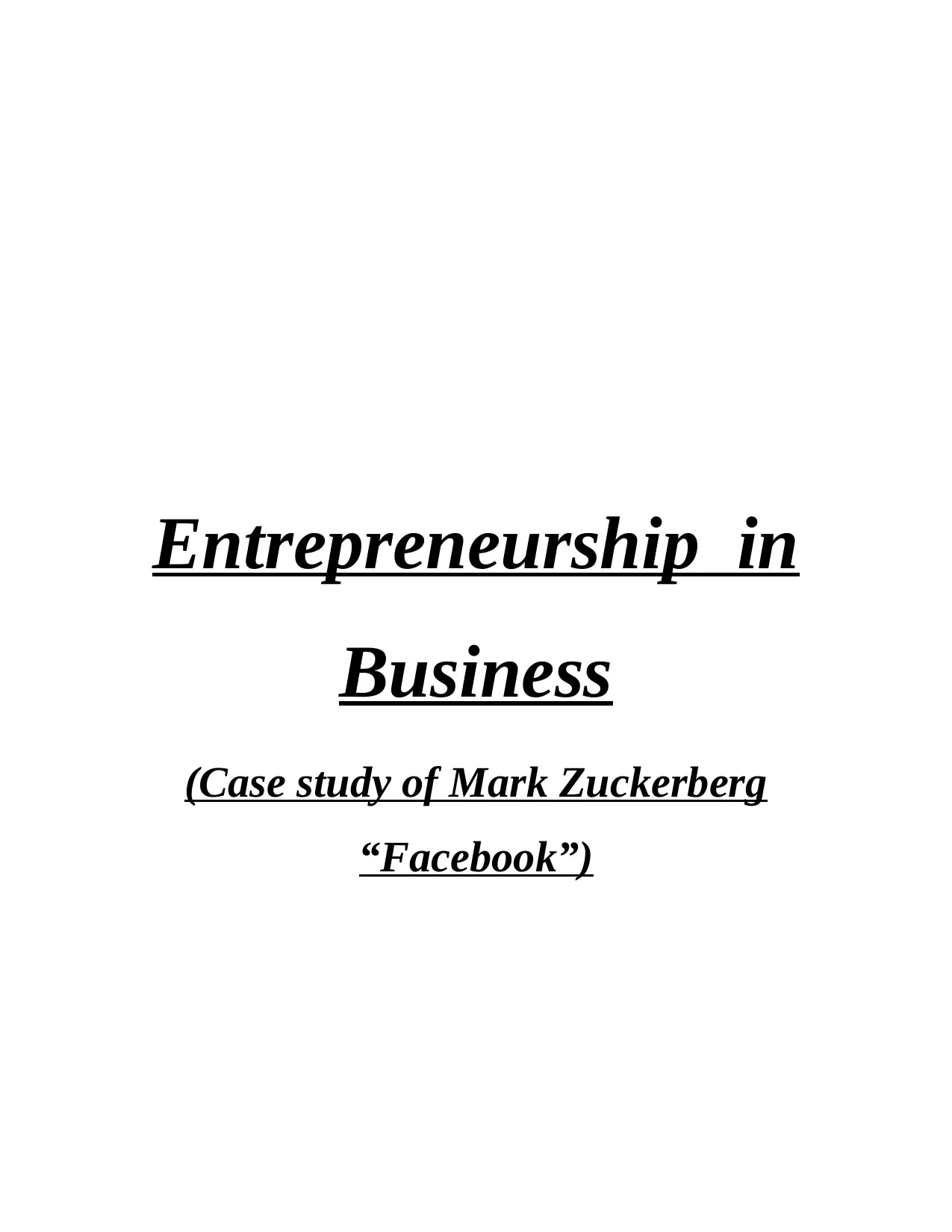
Entrepreneurship in
Business
(Case study of Mark Zuckerberg
“Facebook”)
Business
(Case study of Mark Zuckerberg
“Facebook”)
Secure Best Marks with AI Grader
Need help grading? Try our AI Grader for instant feedback on your assignments.

Table of Contents
INTRODUCTION...........................................................................................................................3
Concepts and theories of Entrepreneurship............................................................................3
Different types of Enterprise..................................................................................................5
Analyse the importance of Entrepreneurship to the individual, organisation and the economy
at large....................................................................................................................................7
CONCLUSION................................................................................................................................8
REFERENCES..............................................................................................................................10
INTRODUCTION...........................................................................................................................3
Concepts and theories of Entrepreneurship............................................................................3
Different types of Enterprise..................................................................................................5
Analyse the importance of Entrepreneurship to the individual, organisation and the economy
at large....................................................................................................................................7
CONCLUSION................................................................................................................................8
REFERENCES..............................................................................................................................10
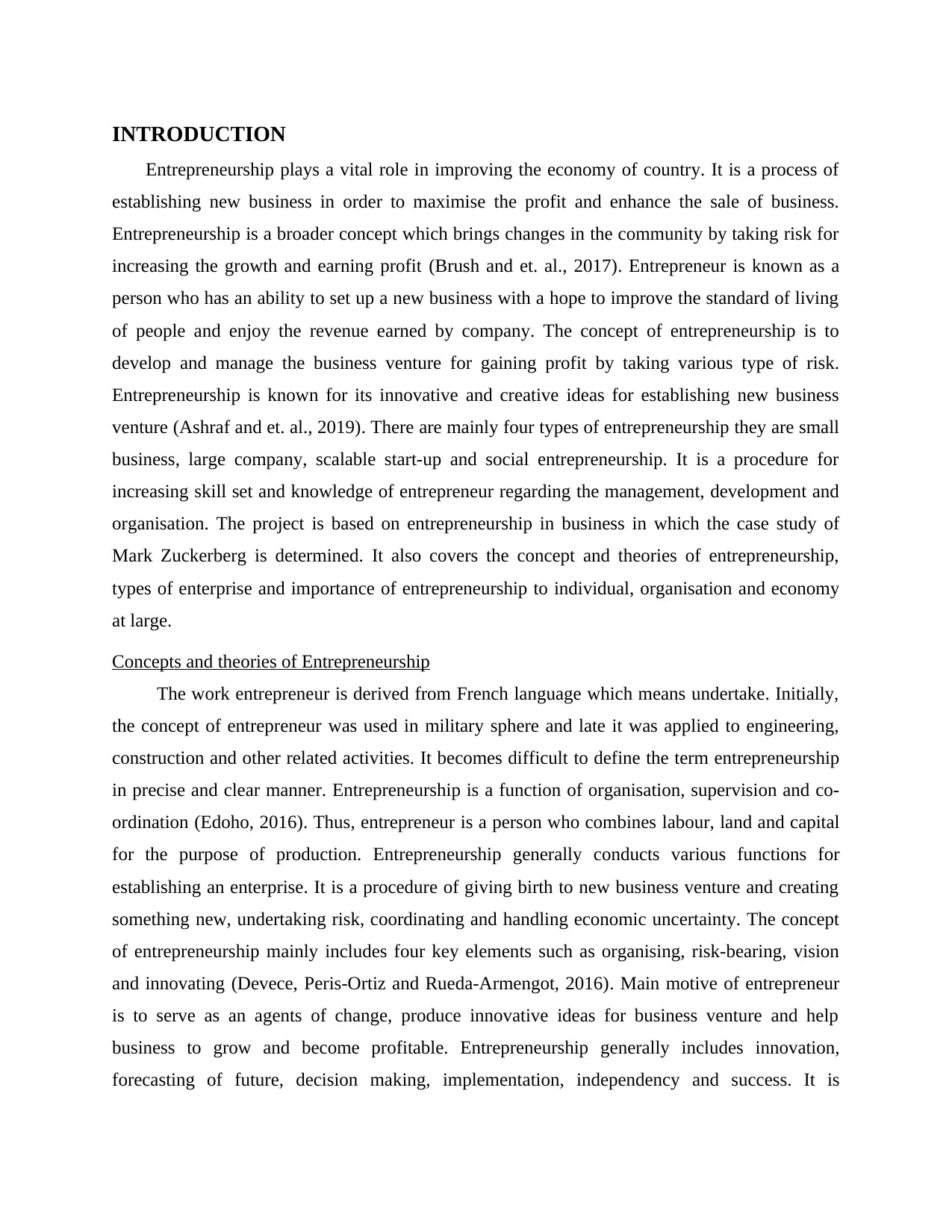
INTRODUCTION
Entrepreneurship plays a vital role in improving the economy of country. It is a process of
establishing new business in order to maximise the profit and enhance the sale of business.
Entrepreneurship is a broader concept which brings changes in the community by taking risk for
increasing the growth and earning profit (Brush and et. al., 2017). Entrepreneur is known as a
person who has an ability to set up a new business with a hope to improve the standard of living
of people and enjoy the revenue earned by company. The concept of entrepreneurship is to
develop and manage the business venture for gaining profit by taking various type of risk.
Entrepreneurship is known for its innovative and creative ideas for establishing new business
venture (Ashraf and et. al., 2019). There are mainly four types of entrepreneurship they are small
business, large company, scalable start-up and social entrepreneurship. It is a procedure for
increasing skill set and knowledge of entrepreneur regarding the management, development and
organisation. The project is based on entrepreneurship in business in which the case study of
Mark Zuckerberg is determined. It also covers the concept and theories of entrepreneurship,
types of enterprise and importance of entrepreneurship to individual, organisation and economy
at large.
Concepts and theories of Entrepreneurship
The work entrepreneur is derived from French language which means undertake. Initially,
the concept of entrepreneur was used in military sphere and late it was applied to engineering,
construction and other related activities. It becomes difficult to define the term entrepreneurship
in precise and clear manner. Entrepreneurship is a function of organisation, supervision and co-
ordination (Edoho, 2016). Thus, entrepreneur is a person who combines labour, land and capital
for the purpose of production. Entrepreneurship generally conducts various functions for
establishing an enterprise. It is a procedure of giving birth to new business venture and creating
something new, undertaking risk, coordinating and handling economic uncertainty. The concept
of entrepreneurship mainly includes four key elements such as organising, risk-bearing, vision
and innovating (Devece, Peris-Ortiz and Rueda-Armengot, 2016). Main motive of entrepreneur
is to serve as an agents of change, produce innovative ideas for business venture and help
business to grow and become profitable. Entrepreneurship generally includes innovation,
forecasting of future, decision making, implementation, independency and success. It is
Entrepreneurship plays a vital role in improving the economy of country. It is a process of
establishing new business in order to maximise the profit and enhance the sale of business.
Entrepreneurship is a broader concept which brings changes in the community by taking risk for
increasing the growth and earning profit (Brush and et. al., 2017). Entrepreneur is known as a
person who has an ability to set up a new business with a hope to improve the standard of living
of people and enjoy the revenue earned by company. The concept of entrepreneurship is to
develop and manage the business venture for gaining profit by taking various type of risk.
Entrepreneurship is known for its innovative and creative ideas for establishing new business
venture (Ashraf and et. al., 2019). There are mainly four types of entrepreneurship they are small
business, large company, scalable start-up and social entrepreneurship. It is a procedure for
increasing skill set and knowledge of entrepreneur regarding the management, development and
organisation. The project is based on entrepreneurship in business in which the case study of
Mark Zuckerberg is determined. It also covers the concept and theories of entrepreneurship,
types of enterprise and importance of entrepreneurship to individual, organisation and economy
at large.
Concepts and theories of Entrepreneurship
The work entrepreneur is derived from French language which means undertake. Initially,
the concept of entrepreneur was used in military sphere and late it was applied to engineering,
construction and other related activities. It becomes difficult to define the term entrepreneurship
in precise and clear manner. Entrepreneurship is a function of organisation, supervision and co-
ordination (Edoho, 2016). Thus, entrepreneur is a person who combines labour, land and capital
for the purpose of production. Entrepreneurship generally conducts various functions for
establishing an enterprise. It is a procedure of giving birth to new business venture and creating
something new, undertaking risk, coordinating and handling economic uncertainty. The concept
of entrepreneurship mainly includes four key elements such as organising, risk-bearing, vision
and innovating (Devece, Peris-Ortiz and Rueda-Armengot, 2016). Main motive of entrepreneur
is to serve as an agents of change, produce innovative ideas for business venture and help
business to grow and become profitable. Entrepreneurship generally includes innovation,
forecasting of future, decision making, implementation, independency and success. It is
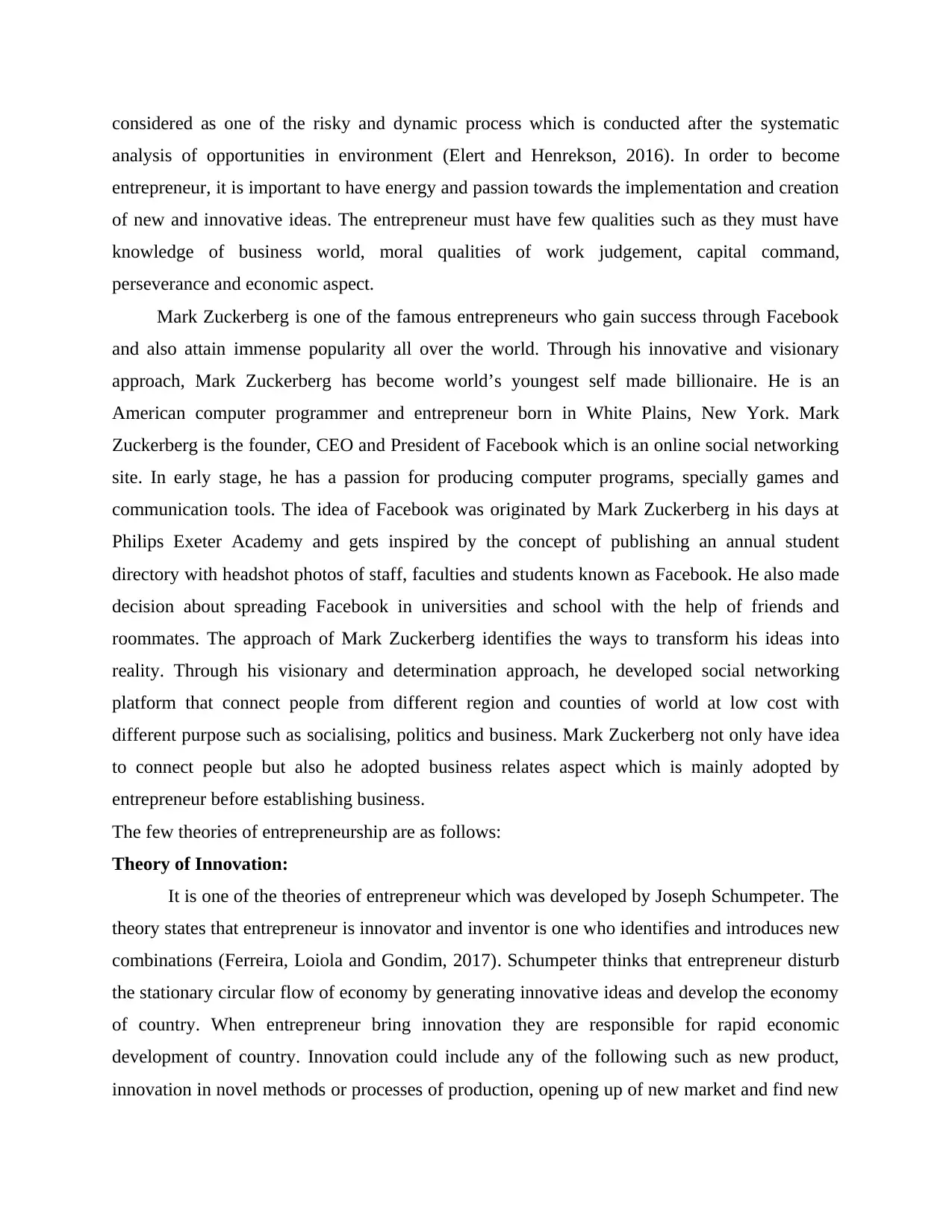
considered as one of the risky and dynamic process which is conducted after the systematic
analysis of opportunities in environment (Elert and Henrekson, 2016). In order to become
entrepreneur, it is important to have energy and passion towards the implementation and creation
of new and innovative ideas. The entrepreneur must have few qualities such as they must have
knowledge of business world, moral qualities of work judgement, capital command,
perseverance and economic aspect.
Mark Zuckerberg is one of the famous entrepreneurs who gain success through Facebook
and also attain immense popularity all over the world. Through his innovative and visionary
approach, Mark Zuckerberg has become world’s youngest self made billionaire. He is an
American computer programmer and entrepreneur born in White Plains, New York. Mark
Zuckerberg is the founder, CEO and President of Facebook which is an online social networking
site. In early stage, he has a passion for producing computer programs, specially games and
communication tools. The idea of Facebook was originated by Mark Zuckerberg in his days at
Philips Exeter Academy and gets inspired by the concept of publishing an annual student
directory with headshot photos of staff, faculties and students known as Facebook. He also made
decision about spreading Facebook in universities and school with the help of friends and
roommates. The approach of Mark Zuckerberg identifies the ways to transform his ideas into
reality. Through his visionary and determination approach, he developed social networking
platform that connect people from different region and counties of world at low cost with
different purpose such as socialising, politics and business. Mark Zuckerberg not only have idea
to connect people but also he adopted business relates aspect which is mainly adopted by
entrepreneur before establishing business.
The few theories of entrepreneurship are as follows:
Theory of Innovation:
It is one of the theories of entrepreneur which was developed by Joseph Schumpeter. The
theory states that entrepreneur is innovator and inventor is one who identifies and introduces new
combinations (Ferreira, Loiola and Gondim, 2017). Schumpeter thinks that entrepreneur disturb
the stationary circular flow of economy by generating innovative ideas and develop the economy
of country. When entrepreneur bring innovation they are responsible for rapid economic
development of country. Innovation could include any of the following such as new product,
innovation in novel methods or processes of production, opening up of new market and find new
analysis of opportunities in environment (Elert and Henrekson, 2016). In order to become
entrepreneur, it is important to have energy and passion towards the implementation and creation
of new and innovative ideas. The entrepreneur must have few qualities such as they must have
knowledge of business world, moral qualities of work judgement, capital command,
perseverance and economic aspect.
Mark Zuckerberg is one of the famous entrepreneurs who gain success through Facebook
and also attain immense popularity all over the world. Through his innovative and visionary
approach, Mark Zuckerberg has become world’s youngest self made billionaire. He is an
American computer programmer and entrepreneur born in White Plains, New York. Mark
Zuckerberg is the founder, CEO and President of Facebook which is an online social networking
site. In early stage, he has a passion for producing computer programs, specially games and
communication tools. The idea of Facebook was originated by Mark Zuckerberg in his days at
Philips Exeter Academy and gets inspired by the concept of publishing an annual student
directory with headshot photos of staff, faculties and students known as Facebook. He also made
decision about spreading Facebook in universities and school with the help of friends and
roommates. The approach of Mark Zuckerberg identifies the ways to transform his ideas into
reality. Through his visionary and determination approach, he developed social networking
platform that connect people from different region and counties of world at low cost with
different purpose such as socialising, politics and business. Mark Zuckerberg not only have idea
to connect people but also he adopted business relates aspect which is mainly adopted by
entrepreneur before establishing business.
The few theories of entrepreneurship are as follows:
Theory of Innovation:
It is one of the theories of entrepreneur which was developed by Joseph Schumpeter. The
theory states that entrepreneur is innovator and inventor is one who identifies and introduces new
combinations (Ferreira, Loiola and Gondim, 2017). Schumpeter thinks that entrepreneur disturb
the stationary circular flow of economy by generating innovative ideas and develop the economy
of country. When entrepreneur bring innovation they are responsible for rapid economic
development of country. Innovation could include any of the following such as new product,
innovation in novel methods or processes of production, opening up of new market and find new
Secure Best Marks with AI Grader
Need help grading? Try our AI Grader for instant feedback on your assignments.
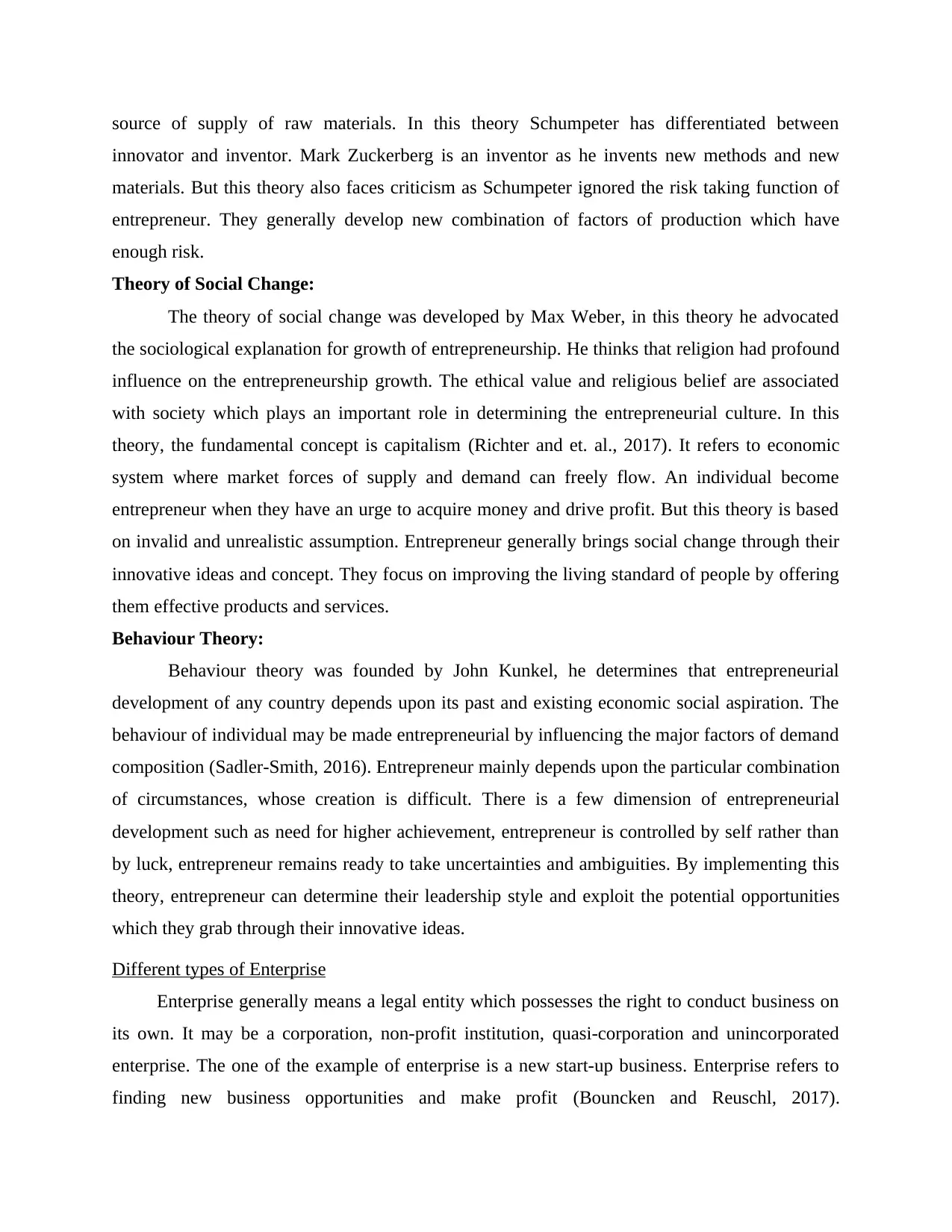
source of supply of raw materials. In this theory Schumpeter has differentiated between
innovator and inventor. Mark Zuckerberg is an inventor as he invents new methods and new
materials. But this theory also faces criticism as Schumpeter ignored the risk taking function of
entrepreneur. They generally develop new combination of factors of production which have
enough risk.
Theory of Social Change:
The theory of social change was developed by Max Weber, in this theory he advocated
the sociological explanation for growth of entrepreneurship. He thinks that religion had profound
influence on the entrepreneurship growth. The ethical value and religious belief are associated
with society which plays an important role in determining the entrepreneurial culture. In this
theory, the fundamental concept is capitalism (Richter and et. al., 2017). It refers to economic
system where market forces of supply and demand can freely flow. An individual become
entrepreneur when they have an urge to acquire money and drive profit. But this theory is based
on invalid and unrealistic assumption. Entrepreneur generally brings social change through their
innovative ideas and concept. They focus on improving the living standard of people by offering
them effective products and services.
Behaviour Theory:
Behaviour theory was founded by John Kunkel, he determines that entrepreneurial
development of any country depends upon its past and existing economic social aspiration. The
behaviour of individual may be made entrepreneurial by influencing the major factors of demand
composition (Sadler-Smith, 2016). Entrepreneur mainly depends upon the particular combination
of circumstances, whose creation is difficult. There is a few dimension of entrepreneurial
development such as need for higher achievement, entrepreneur is controlled by self rather than
by luck, entrepreneur remains ready to take uncertainties and ambiguities. By implementing this
theory, entrepreneur can determine their leadership style and exploit the potential opportunities
which they grab through their innovative ideas.
Different types of Enterprise
Enterprise generally means a legal entity which possesses the right to conduct business on
its own. It may be a corporation, non-profit institution, quasi-corporation and unincorporated
enterprise. The one of the example of enterprise is a new start-up business. Enterprise refers to
finding new business opportunities and make profit (Bouncken and Reuschl, 2017).
innovator and inventor. Mark Zuckerberg is an inventor as he invents new methods and new
materials. But this theory also faces criticism as Schumpeter ignored the risk taking function of
entrepreneur. They generally develop new combination of factors of production which have
enough risk.
Theory of Social Change:
The theory of social change was developed by Max Weber, in this theory he advocated
the sociological explanation for growth of entrepreneurship. He thinks that religion had profound
influence on the entrepreneurship growth. The ethical value and religious belief are associated
with society which plays an important role in determining the entrepreneurial culture. In this
theory, the fundamental concept is capitalism (Richter and et. al., 2017). It refers to economic
system where market forces of supply and demand can freely flow. An individual become
entrepreneur when they have an urge to acquire money and drive profit. But this theory is based
on invalid and unrealistic assumption. Entrepreneur generally brings social change through their
innovative ideas and concept. They focus on improving the living standard of people by offering
them effective products and services.
Behaviour Theory:
Behaviour theory was founded by John Kunkel, he determines that entrepreneurial
development of any country depends upon its past and existing economic social aspiration. The
behaviour of individual may be made entrepreneurial by influencing the major factors of demand
composition (Sadler-Smith, 2016). Entrepreneur mainly depends upon the particular combination
of circumstances, whose creation is difficult. There is a few dimension of entrepreneurial
development such as need for higher achievement, entrepreneur is controlled by self rather than
by luck, entrepreneur remains ready to take uncertainties and ambiguities. By implementing this
theory, entrepreneur can determine their leadership style and exploit the potential opportunities
which they grab through their innovative ideas.
Different types of Enterprise
Enterprise generally means a legal entity which possesses the right to conduct business on
its own. It may be a corporation, non-profit institution, quasi-corporation and unincorporated
enterprise. The one of the example of enterprise is a new start-up business. Enterprise refers to
finding new business opportunities and make profit (Bouncken and Reuschl, 2017).
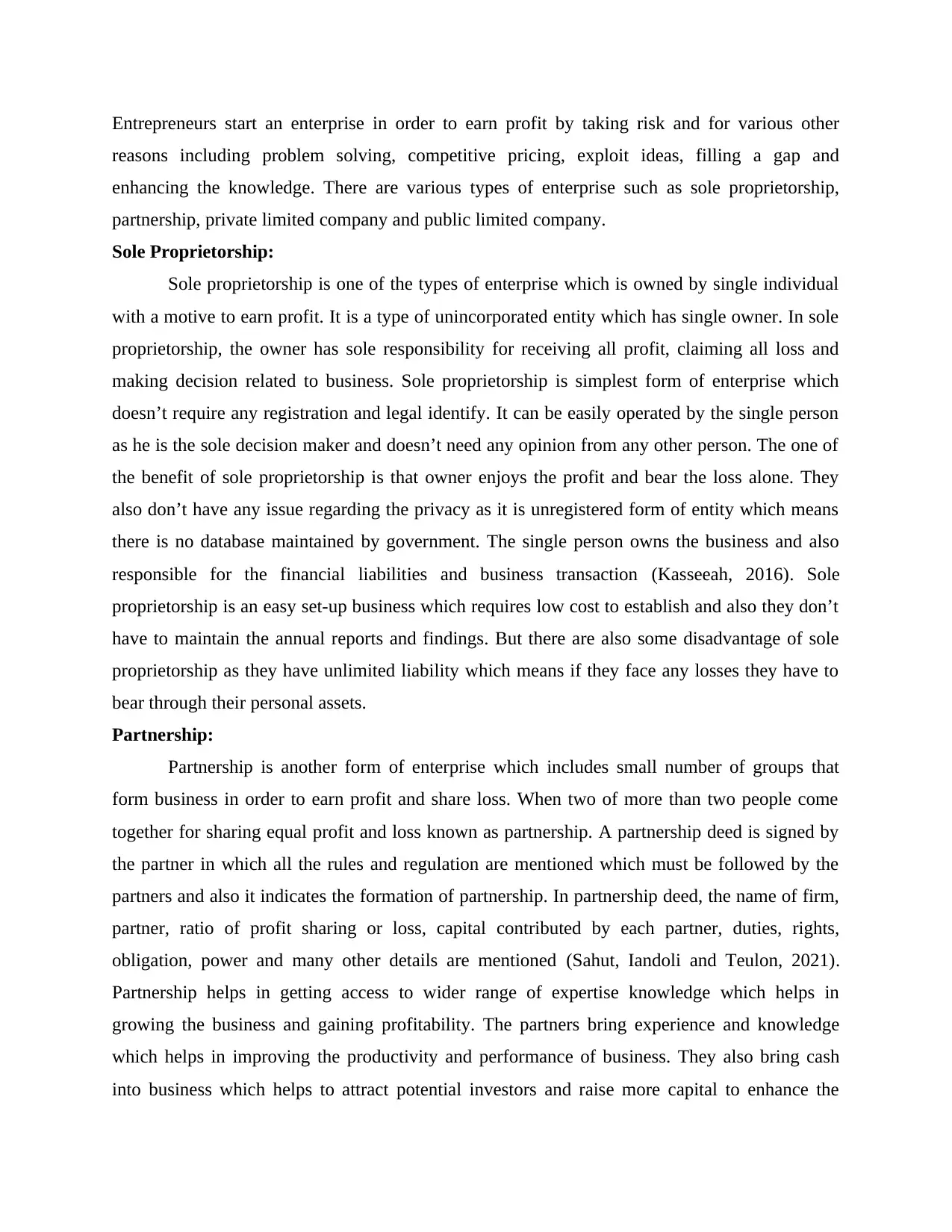
Entrepreneurs start an enterprise in order to earn profit by taking risk and for various other
reasons including problem solving, competitive pricing, exploit ideas, filling a gap and
enhancing the knowledge. There are various types of enterprise such as sole proprietorship,
partnership, private limited company and public limited company.
Sole Proprietorship:
Sole proprietorship is one of the types of enterprise which is owned by single individual
with a motive to earn profit. It is a type of unincorporated entity which has single owner. In sole
proprietorship, the owner has sole responsibility for receiving all profit, claiming all loss and
making decision related to business. Sole proprietorship is simplest form of enterprise which
doesn’t require any registration and legal identify. It can be easily operated by the single person
as he is the sole decision maker and doesn’t need any opinion from any other person. The one of
the benefit of sole proprietorship is that owner enjoys the profit and bear the loss alone. They
also don’t have any issue regarding the privacy as it is unregistered form of entity which means
there is no database maintained by government. The single person owns the business and also
responsible for the financial liabilities and business transaction (Kasseeah, 2016). Sole
proprietorship is an easy set-up business which requires low cost to establish and also they don’t
have to maintain the annual reports and findings. But there are also some disadvantage of sole
proprietorship as they have unlimited liability which means if they face any losses they have to
bear through their personal assets.
Partnership:
Partnership is another form of enterprise which includes small number of groups that
form business in order to earn profit and share loss. When two of more than two people come
together for sharing equal profit and loss known as partnership. A partnership deed is signed by
the partner in which all the rules and regulation are mentioned which must be followed by the
partners and also it indicates the formation of partnership. In partnership deed, the name of firm,
partner, ratio of profit sharing or loss, capital contributed by each partner, duties, rights,
obligation, power and many other details are mentioned (Sahut, Iandoli and Teulon, 2021).
Partnership helps in getting access to wider range of expertise knowledge which helps in
growing the business and gaining profitability. The partners bring experience and knowledge
which helps in improving the productivity and performance of business. They also bring cash
into business which helps to attract potential investors and raise more capital to enhance the
reasons including problem solving, competitive pricing, exploit ideas, filling a gap and
enhancing the knowledge. There are various types of enterprise such as sole proprietorship,
partnership, private limited company and public limited company.
Sole Proprietorship:
Sole proprietorship is one of the types of enterprise which is owned by single individual
with a motive to earn profit. It is a type of unincorporated entity which has single owner. In sole
proprietorship, the owner has sole responsibility for receiving all profit, claiming all loss and
making decision related to business. Sole proprietorship is simplest form of enterprise which
doesn’t require any registration and legal identify. It can be easily operated by the single person
as he is the sole decision maker and doesn’t need any opinion from any other person. The one of
the benefit of sole proprietorship is that owner enjoys the profit and bear the loss alone. They
also don’t have any issue regarding the privacy as it is unregistered form of entity which means
there is no database maintained by government. The single person owns the business and also
responsible for the financial liabilities and business transaction (Kasseeah, 2016). Sole
proprietorship is an easy set-up business which requires low cost to establish and also they don’t
have to maintain the annual reports and findings. But there are also some disadvantage of sole
proprietorship as they have unlimited liability which means if they face any losses they have to
bear through their personal assets.
Partnership:
Partnership is another form of enterprise which includes small number of groups that
form business in order to earn profit and share loss. When two of more than two people come
together for sharing equal profit and loss known as partnership. A partnership deed is signed by
the partner in which all the rules and regulation are mentioned which must be followed by the
partners and also it indicates the formation of partnership. In partnership deed, the name of firm,
partner, ratio of profit sharing or loss, capital contributed by each partner, duties, rights,
obligation, power and many other details are mentioned (Sahut, Iandoli and Teulon, 2021).
Partnership helps in getting access to wider range of expertise knowledge which helps in
growing the business and gaining profitability. The partners bring experience and knowledge
which helps in improving the productivity and performance of business. They also bring cash
into business which helps to attract potential investors and raise more capital to enhance the
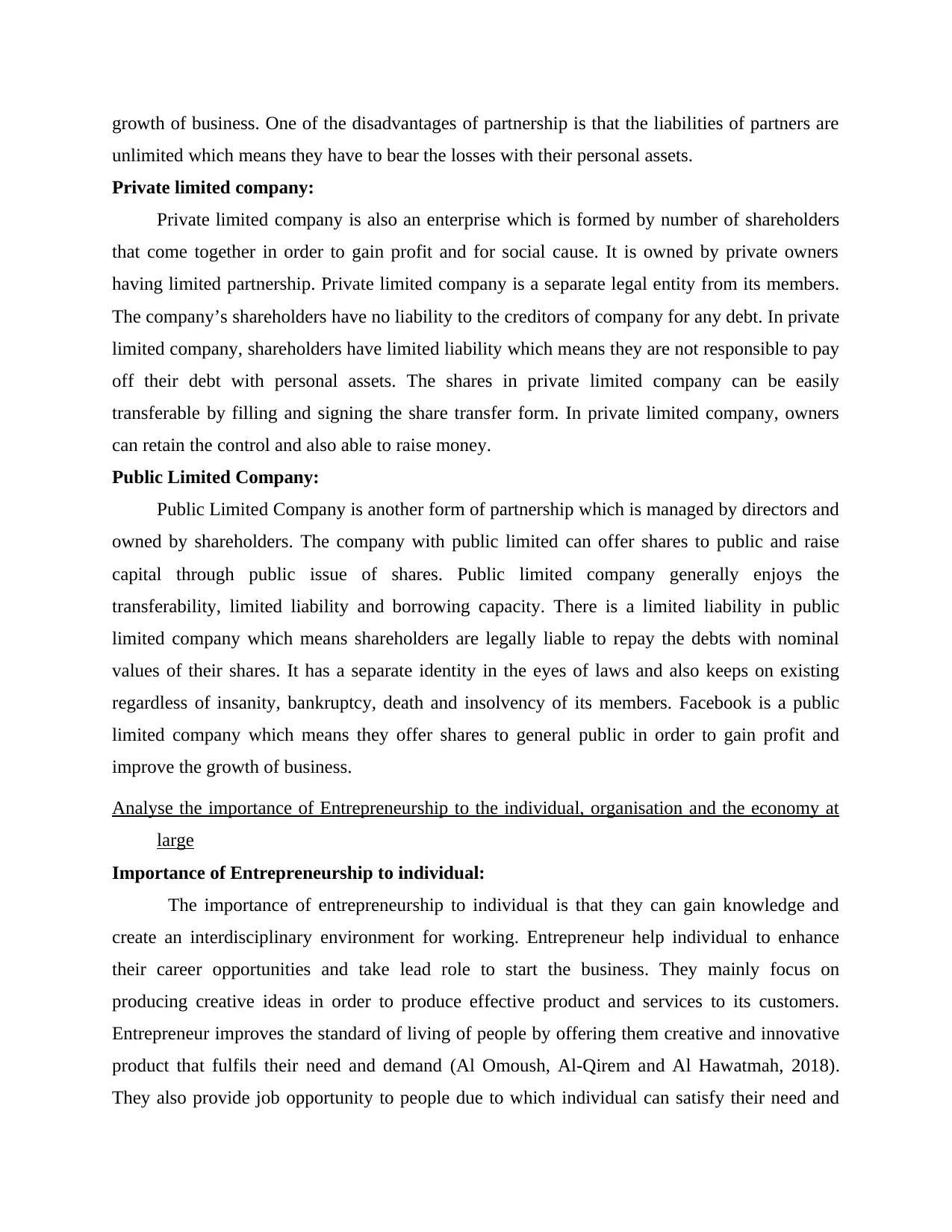
growth of business. One of the disadvantages of partnership is that the liabilities of partners are
unlimited which means they have to bear the losses with their personal assets.
Private limited company:
Private limited company is also an enterprise which is formed by number of shareholders
that come together in order to gain profit and for social cause. It is owned by private owners
having limited partnership. Private limited company is a separate legal entity from its members.
The company’s shareholders have no liability to the creditors of company for any debt. In private
limited company, shareholders have limited liability which means they are not responsible to pay
off their debt with personal assets. The shares in private limited company can be easily
transferable by filling and signing the share transfer form. In private limited company, owners
can retain the control and also able to raise money.
Public Limited Company:
Public Limited Company is another form of partnership which is managed by directors and
owned by shareholders. The company with public limited can offer shares to public and raise
capital through public issue of shares. Public limited company generally enjoys the
transferability, limited liability and borrowing capacity. There is a limited liability in public
limited company which means shareholders are legally liable to repay the debts with nominal
values of their shares. It has a separate identity in the eyes of laws and also keeps on existing
regardless of insanity, bankruptcy, death and insolvency of its members. Facebook is a public
limited company which means they offer shares to general public in order to gain profit and
improve the growth of business.
Analyse the importance of Entrepreneurship to the individual, organisation and the economy at
large
Importance of Entrepreneurship to individual:
The importance of entrepreneurship to individual is that they can gain knowledge and
create an interdisciplinary environment for working. Entrepreneur help individual to enhance
their career opportunities and take lead role to start the business. They mainly focus on
producing creative ideas in order to produce effective product and services to its customers.
Entrepreneur improves the standard of living of people by offering them creative and innovative
product that fulfils their need and demand (Al Omoush, Al-Qirem and Al Hawatmah, 2018).
They also provide job opportunity to people due to which individual can satisfy their need and
unlimited which means they have to bear the losses with their personal assets.
Private limited company:
Private limited company is also an enterprise which is formed by number of shareholders
that come together in order to gain profit and for social cause. It is owned by private owners
having limited partnership. Private limited company is a separate legal entity from its members.
The company’s shareholders have no liability to the creditors of company for any debt. In private
limited company, shareholders have limited liability which means they are not responsible to pay
off their debt with personal assets. The shares in private limited company can be easily
transferable by filling and signing the share transfer form. In private limited company, owners
can retain the control and also able to raise money.
Public Limited Company:
Public Limited Company is another form of partnership which is managed by directors and
owned by shareholders. The company with public limited can offer shares to public and raise
capital through public issue of shares. Public limited company generally enjoys the
transferability, limited liability and borrowing capacity. There is a limited liability in public
limited company which means shareholders are legally liable to repay the debts with nominal
values of their shares. It has a separate identity in the eyes of laws and also keeps on existing
regardless of insanity, bankruptcy, death and insolvency of its members. Facebook is a public
limited company which means they offer shares to general public in order to gain profit and
improve the growth of business.
Analyse the importance of Entrepreneurship to the individual, organisation and the economy at
large
Importance of Entrepreneurship to individual:
The importance of entrepreneurship to individual is that they can gain knowledge and
create an interdisciplinary environment for working. Entrepreneur help individual to enhance
their career opportunities and take lead role to start the business. They mainly focus on
producing creative ideas in order to produce effective product and services to its customers.
Entrepreneur improves the standard of living of people by offering them creative and innovative
product that fulfils their need and demand (Al Omoush, Al-Qirem and Al Hawatmah, 2018).
They also provide job opportunity to people due to which individual can satisfy their need and
Paraphrase This Document
Need a fresh take? Get an instant paraphrase of this document with our AI Paraphraser
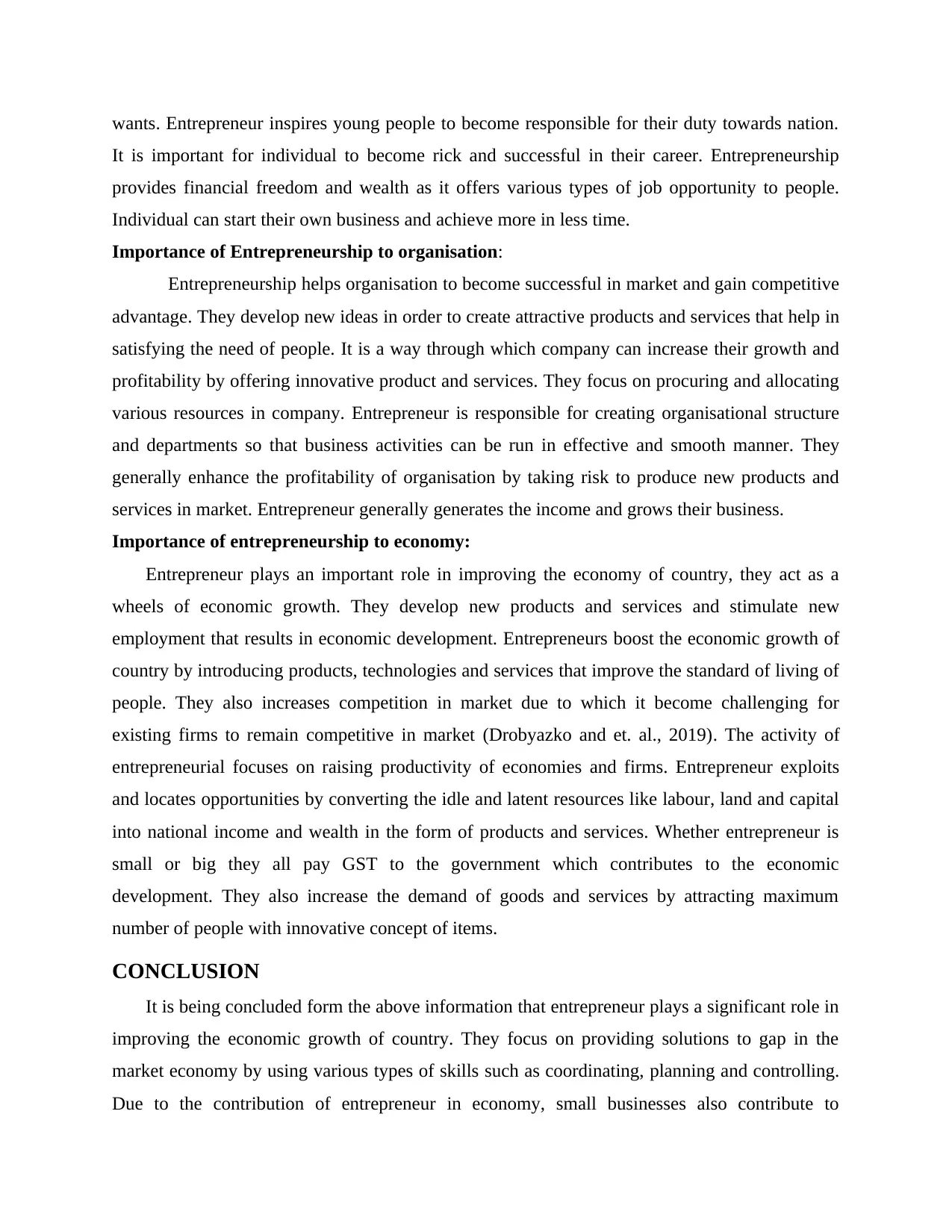
wants. Entrepreneur inspires young people to become responsible for their duty towards nation.
It is important for individual to become rick and successful in their career. Entrepreneurship
provides financial freedom and wealth as it offers various types of job opportunity to people.
Individual can start their own business and achieve more in less time.
Importance of Entrepreneurship to organisation:
Entrepreneurship helps organisation to become successful in market and gain competitive
advantage. They develop new ideas in order to create attractive products and services that help in
satisfying the need of people. It is a way through which company can increase their growth and
profitability by offering innovative product and services. They focus on procuring and allocating
various resources in company. Entrepreneur is responsible for creating organisational structure
and departments so that business activities can be run in effective and smooth manner. They
generally enhance the profitability of organisation by taking risk to produce new products and
services in market. Entrepreneur generally generates the income and grows their business.
Importance of entrepreneurship to economy:
Entrepreneur plays an important role in improving the economy of country, they act as a
wheels of economic growth. They develop new products and services and stimulate new
employment that results in economic development. Entrepreneurs boost the economic growth of
country by introducing products, technologies and services that improve the standard of living of
people. They also increases competition in market due to which it become challenging for
existing firms to remain competitive in market (Drobyazko and et. al., 2019). The activity of
entrepreneurial focuses on raising productivity of economies and firms. Entrepreneur exploits
and locates opportunities by converting the idle and latent resources like labour, land and capital
into national income and wealth in the form of products and services. Whether entrepreneur is
small or big they all pay GST to the government which contributes to the economic
development. They also increase the demand of goods and services by attracting maximum
number of people with innovative concept of items.
CONCLUSION
It is being concluded form the above information that entrepreneur plays a significant role in
improving the economic growth of country. They focus on providing solutions to gap in the
market economy by using various types of skills such as coordinating, planning and controlling.
Due to the contribution of entrepreneur in economy, small businesses also contribute to
It is important for individual to become rick and successful in their career. Entrepreneurship
provides financial freedom and wealth as it offers various types of job opportunity to people.
Individual can start their own business and achieve more in less time.
Importance of Entrepreneurship to organisation:
Entrepreneurship helps organisation to become successful in market and gain competitive
advantage. They develop new ideas in order to create attractive products and services that help in
satisfying the need of people. It is a way through which company can increase their growth and
profitability by offering innovative product and services. They focus on procuring and allocating
various resources in company. Entrepreneur is responsible for creating organisational structure
and departments so that business activities can be run in effective and smooth manner. They
generally enhance the profitability of organisation by taking risk to produce new products and
services in market. Entrepreneur generally generates the income and grows their business.
Importance of entrepreneurship to economy:
Entrepreneur plays an important role in improving the economy of country, they act as a
wheels of economic growth. They develop new products and services and stimulate new
employment that results in economic development. Entrepreneurs boost the economic growth of
country by introducing products, technologies and services that improve the standard of living of
people. They also increases competition in market due to which it become challenging for
existing firms to remain competitive in market (Drobyazko and et. al., 2019). The activity of
entrepreneurial focuses on raising productivity of economies and firms. Entrepreneur exploits
and locates opportunities by converting the idle and latent resources like labour, land and capital
into national income and wealth in the form of products and services. Whether entrepreneur is
small or big they all pay GST to the government which contributes to the economic
development. They also increase the demand of goods and services by attracting maximum
number of people with innovative concept of items.
CONCLUSION
It is being concluded form the above information that entrepreneur plays a significant role in
improving the economic growth of country. They focus on providing solutions to gap in the
market economy by using various types of skills such as coordinating, planning and controlling.
Due to the contribution of entrepreneur in economy, small businesses also contribute to

competition, employment, innovation and political stability. Through entrepreneurship, people
gain new and innovative products and services that satisfy their need and also enhance their
living standard. Entrepreneur also helps in providing job opportunity to people due to which the
unemployment rate of country decreases. Students and learners can gain opportunity to cultivate
creative skills and think outside the box in order to become good entrepreneur. The young
people must identify their entrepreneurship skill by thinking creatively, build problem solving
skill and cultivate their analytical skill in order to gain better career opportunities and establish
their own business.
gain new and innovative products and services that satisfy their need and also enhance their
living standard. Entrepreneur also helps in providing job opportunity to people due to which the
unemployment rate of country decreases. Students and learners can gain opportunity to cultivate
creative skills and think outside the box in order to become good entrepreneur. The young
people must identify their entrepreneurship skill by thinking creatively, build problem solving
skill and cultivate their analytical skill in order to gain better career opportunities and establish
their own business.
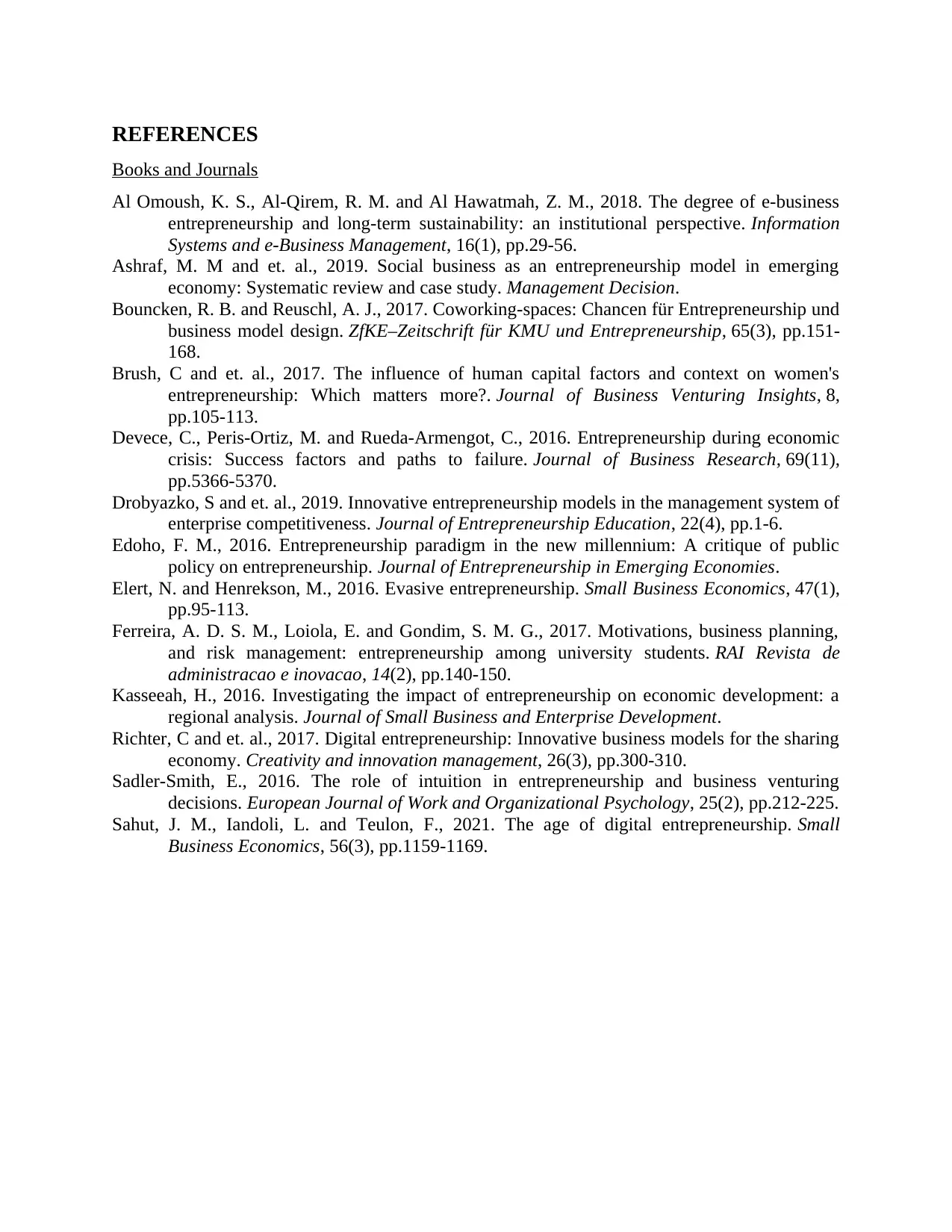
REFERENCES
Books and Journals
Al Omoush, K. S., Al-Qirem, R. M. and Al Hawatmah, Z. M., 2018. The degree of e-business
entrepreneurship and long-term sustainability: an institutional perspective. Information
Systems and e-Business Management, 16(1), pp.29-56.
Ashraf, M. M and et. al., 2019. Social business as an entrepreneurship model in emerging
economy: Systematic review and case study. Management Decision.
Bouncken, R. B. and Reuschl, A. J., 2017. Coworking-spaces: Chancen für Entrepreneurship und
business model design. ZfKE–Zeitschrift für KMU und Entrepreneurship, 65(3), pp.151-
168.
Brush, C and et. al., 2017. The influence of human capital factors and context on women's
entrepreneurship: Which matters more?. Journal of Business Venturing Insights, 8,
pp.105-113.
Devece, C., Peris-Ortiz, M. and Rueda-Armengot, C., 2016. Entrepreneurship during economic
crisis: Success factors and paths to failure. Journal of Business Research, 69(11),
pp.5366-5370.
Drobyazko, S and et. al., 2019. Innovative entrepreneurship models in the management system of
enterprise competitiveness. Journal of Entrepreneurship Education, 22(4), pp.1-6.
Edoho, F. M., 2016. Entrepreneurship paradigm in the new millennium: A critique of public
policy on entrepreneurship. Journal of Entrepreneurship in Emerging Economies.
Elert, N. and Henrekson, M., 2016. Evasive entrepreneurship. Small Business Economics, 47(1),
pp.95-113.
Ferreira, A. D. S. M., Loiola, E. and Gondim, S. M. G., 2017. Motivations, business planning,
and risk management: entrepreneurship among university students. RAI Revista de
administracao e inovacao, 14(2), pp.140-150.
Kasseeah, H., 2016. Investigating the impact of entrepreneurship on economic development: a
regional analysis. Journal of Small Business and Enterprise Development.
Richter, C and et. al., 2017. Digital entrepreneurship: Innovative business models for the sharing
economy. Creativity and innovation management, 26(3), pp.300-310.
Sadler-Smith, E., 2016. The role of intuition in entrepreneurship and business venturing
decisions. European Journal of Work and Organizational Psychology, 25(2), pp.212-225.
Sahut, J. M., Iandoli, L. and Teulon, F., 2021. The age of digital entrepreneurship. Small
Business Economics, 56(3), pp.1159-1169.
Books and Journals
Al Omoush, K. S., Al-Qirem, R. M. and Al Hawatmah, Z. M., 2018. The degree of e-business
entrepreneurship and long-term sustainability: an institutional perspective. Information
Systems and e-Business Management, 16(1), pp.29-56.
Ashraf, M. M and et. al., 2019. Social business as an entrepreneurship model in emerging
economy: Systematic review and case study. Management Decision.
Bouncken, R. B. and Reuschl, A. J., 2017. Coworking-spaces: Chancen für Entrepreneurship und
business model design. ZfKE–Zeitschrift für KMU und Entrepreneurship, 65(3), pp.151-
168.
Brush, C and et. al., 2017. The influence of human capital factors and context on women's
entrepreneurship: Which matters more?. Journal of Business Venturing Insights, 8,
pp.105-113.
Devece, C., Peris-Ortiz, M. and Rueda-Armengot, C., 2016. Entrepreneurship during economic
crisis: Success factors and paths to failure. Journal of Business Research, 69(11),
pp.5366-5370.
Drobyazko, S and et. al., 2019. Innovative entrepreneurship models in the management system of
enterprise competitiveness. Journal of Entrepreneurship Education, 22(4), pp.1-6.
Edoho, F. M., 2016. Entrepreneurship paradigm in the new millennium: A critique of public
policy on entrepreneurship. Journal of Entrepreneurship in Emerging Economies.
Elert, N. and Henrekson, M., 2016. Evasive entrepreneurship. Small Business Economics, 47(1),
pp.95-113.
Ferreira, A. D. S. M., Loiola, E. and Gondim, S. M. G., 2017. Motivations, business planning,
and risk management: entrepreneurship among university students. RAI Revista de
administracao e inovacao, 14(2), pp.140-150.
Kasseeah, H., 2016. Investigating the impact of entrepreneurship on economic development: a
regional analysis. Journal of Small Business and Enterprise Development.
Richter, C and et. al., 2017. Digital entrepreneurship: Innovative business models for the sharing
economy. Creativity and innovation management, 26(3), pp.300-310.
Sadler-Smith, E., 2016. The role of intuition in entrepreneurship and business venturing
decisions. European Journal of Work and Organizational Psychology, 25(2), pp.212-225.
Sahut, J. M., Iandoli, L. and Teulon, F., 2021. The age of digital entrepreneurship. Small
Business Economics, 56(3), pp.1159-1169.
1 out of 10
Related Documents
Your All-in-One AI-Powered Toolkit for Academic Success.
+13062052269
info@desklib.com
Available 24*7 on WhatsApp / Email
![[object Object]](/_next/static/media/star-bottom.7253800d.svg)
Unlock your academic potential
© 2024 | Zucol Services PVT LTD | All rights reserved.





